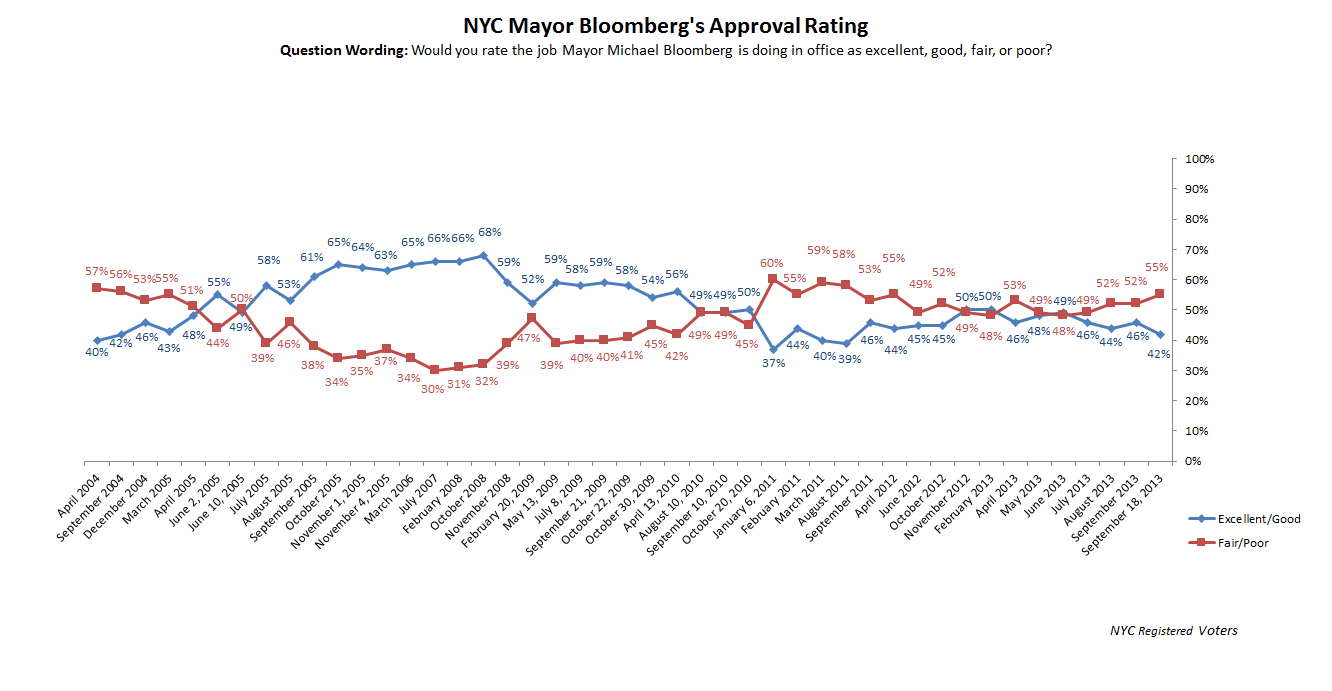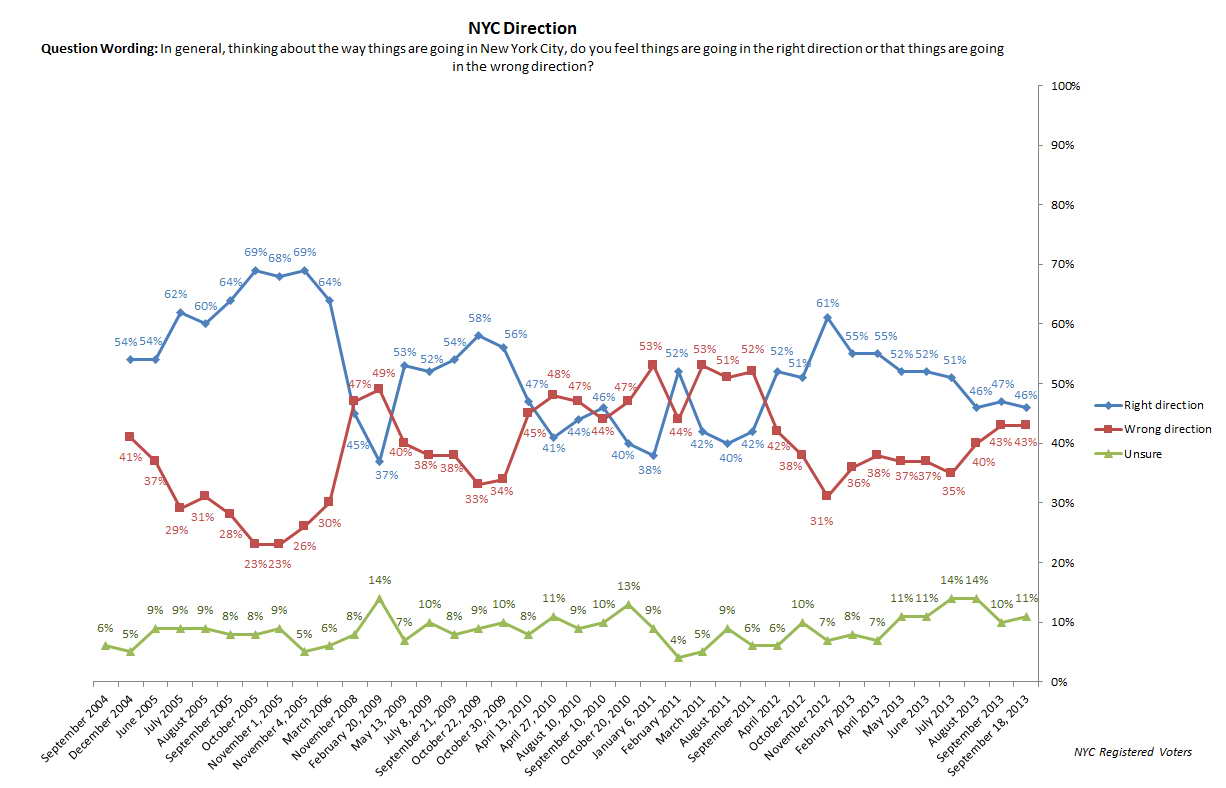September 18, 2013
9/18: de Blasio Outpaces Lhota in NYC Mayor’s Race
NBC 4 NY/WSJ/Marist New York City Poll
The race for New York City mayor now turns toward the general election. Among likely voters, including those who are undecided yet leaning toward a candidate, Democrat Bill de Blasio leads Republican Joe Lhota, 65% to 22%. Independence candidate Adolfo Carrion — 3% — trails in third place. One percent supports another candidate, and 9% are undecided.
POLL MUST BE SOURCED: The Wall Street Journal/NBC 4 New York/Marist Poll
“Joe Lhota must attract many Democrats to be competitive against the heavily favored Bill de Blasio, and right now, that’s not happening,” says Dr. Lee M. Miringoff, Director of The Marist College Institute for Public Opinion. “De Blasio is very well-liked and is cornering the market on most of the issues and qualities that matter to voters.”
Candidate support divides along party lines. However, de Blasio receives the backing of one in four likely Republican voters — 25% — while Lhota attracts merely 13% of Democrats.
By party:
- 77% of likely Democratic voters citywide are for de Blasio. This compares with 13% for Lhota, and 1% for Carrion.
- Among Republicans who are likely to vote, more than six in ten — 63% — are behind Lhota. A notable 25% support de Blasio, and 5% are for Carrion.
- Half of non-enrolled voters who are likely to vote — 50% — support de Blasio. 24% back Lhota, and 9% are for Carrion.
There are also racial differences. 86% of African American voters who are likely to vote and 74% of likely Latino voters support de Blasio. Lhota receives the support of 3% of African American voters and 11% of Latino voters likely to participate on Election Day. The contest is closer among white voters who are likely to cast a ballot. Here, de Blasio has the support of 50% to 37% for Lhota.
54% of likely New York City voters with a candidate preference say they strongly support their choice of candidate. 33% are somewhat committed to their pick, and only 13% might vote differently. One percent is unsure.
Looking at the candidates’ support, 58% of likely voters who are behind de Blasio strongly support him. This compares with 47% of Lhota’s backers who express the same level of support.
Among registered voters in New York City, de Blasio — 63% — leads Lhota — 20%. Four percent of registered voters citywide are for Carrion while 2% want to elect another candidate. 12% are undecided.
Table: 2013 Race for New York City Mayor (NYC Likely Voters with Leaners)
Table: 2013 Race for New York City Mayor (NYC Registered Voters with Leaners)
Many Voters View de Blasio Favorably… Lhota’s Rating Upside Down
Nearly two in three registered voters citywide — 65% — have a positive impression of de Blasio. 19% have an unfavorable opinion of him, and 16% have either never heard of him or are unsure how to rate him. It’s a different story for candidate Lhota. 41% have an unfavorable view of Lhota while 29% have a favorable impression of him. A notable 30% have either never heard of him or are unsure how to rate him.
When it comes to Carrion, he is not well known to voters. While 23% have an unfavorable opinion of him and 19% have a favorable view of Carrion, almost six in ten New York City registered voters — 58% — have either never heard of him or are unsure how to rate him.
Table: Bill de Blasio Favorability (NYC Registered Voters)
Table: Joe Lhota Favorability (NYC Registered Voters)
Table: Adolfo Carrion Favorability (NYC Registered Voters)
The Nitty-Gritty of Campaign Issues and Candidate Qualities
How do voters compare de Blasio and Lhota on the issues? In most areas, de Blasio outdistances Lhota by wide margins. However, there are two notable exceptions. De Blasio and Lhota are more competitive when it comes to who is better able to handle the city’s finances or who is more likely to keep crime down.
Among New York City registered voters:
- 67% of registered voters think de Blasio is the candidate who will better unify the city. 19% have this view of Lhota, and 14% are unsure.
- De Blasio — 65% — is also viewed as the candidate who is more likely to improve the city’s public schools. 18%, however, think Lhota is the candidate who has the tools to enhance the city’s schools, and 18% are unsure.
- When it comes to making the city more affordable, more than six in ten — 63% — believe de Blasio is more capable of doing so. This compares with 20% who have this opinion of Lhota. 17% are unsure.
- 62% of voters say de Blasio better understands their problems. 22% report Lhota is the candidate who is more likely to identify with their concerns, and 16% are unsure.
- Which candidate will better lead the city during a crisis? A majority — 56% — thinks de Blasio will better lead during such a time. 30% believe Lhota is the man to turn to during a crisis, and 14% are unsure.
- When it comes to keeping businesses in the Big Apple, 55% say de Blasio will do more to keep them in New York City. More than three in ten — 31% — report Lhota is the candidate who will make the greater effort to ensure businesses remain in the city. 14% are unsure.
- A majority of registered voters in New York City — 54% — view de Blasio as the mayoral candidate who has the experience to manage the city. 31% have this impression of Lhota, and 15% are unsure.
- However, de Blasio — 45% — and Lhota — 35% — are more closely matched when voters choose the candidate who is better able to handle the city’s finances. 20% are unsure.
- Similarly, when it comes to keeping crime down, 44% of voters think de Blasio will do a better job while 35% have this impression of Lhota. About one in five voters — 21% — is unsure.
Table: NYC Mayoral Candidate who will Better Unite the City (NYC Registered Voters)
Table: NYC Mayoral Candidate who will Better Lead the City in a Crisis (NYC Registered Voters)
Table: NYC Mayoral Candidate who will do More to Keep Businesses in the City (NYC Registered Voters)
Table: NYC Mayoral Candidate who has the Experience to Manage the City (NYC Registered Voters)
Table: NYC Mayoral Candidate who is More Likely to Keep Crime Down (NYC Registered Voters)
Many Voters View de Blasio’s Ideology as In Step… Little Consensus about Lhota
59% of registered voters in New York City think de Blasio’s ideology is about right. 22% believe he is too liberal, and only 5% say he is too conservative. 14% are unsure. When it comes to voters’ perceptions of Lhota, 32% report his ideology is about right. 31% think he is too conservative while 7% believe he is too liberal. Nearly three in ten — 29% — are unsure.
Table: Bill de Blasio’s Ideology (NYC Registered Voters)
Table: Joe Lhota’s Ideology (NYC Registered Voters)
Giuliani Endorsement Not the Answer to Lhota’s Electoral Success
The endorsement of former New York City Mayor Rudy Giuliani could do more harm than good for Lhota. While 29% of registered voters citywide say Giuliani’s backing makes them more likely to support Lhota, a majority — 51% — says it makes them less likely to vote for him. 15% of voters report Giuliani’s endorsement makes no difference to their vote, and 5% are unsure.
Not surprisingly, there is a partisan divide. Nearly six in ten New York City Democrats — 59% — think Giuliani’s endorsement of Lhota makes them less likely to support him, and only 22% say it makes them more likely to back him. Many Republican voters — 61% — view the Giuliani endorsement as a plus while 19% disagree. 46% of non-enrolled voters report Giuliani’s endorsement of Lhota makes them less likely to cast their ballot for him compared with 32% of these voters who see it as a positive.
Change is in the Air
68% of registered voters want the next mayor to move the city in a different direction while just 25% want him to continue Mayor Bloomberg’s policies. Seven percent are unsure. Among registered voters who want to see the city move in another direction, 70% support de Blasio, and 14% back Lhota. Among registered voters who want to continue the Bloomberg policies, 45% support de Blasio, and 34% back Lhota.
Stop and frisk is a Bloomberg-era policy many voters want to amend. 58% of registered voters citywide want the next mayor to significantly change the Bloomberg policy of stop and frisk. 36%, however, want the controversial policy to continue. Seven percent are unsure.
Racial differences exist. 75% of African American voters and 63% of Latino voters want the policy of stop and frisk to be overhauled. This compares with just 44% of white voters who share this view.
More than two-thirds of registered voters — 68% — agree with the centerpiece of the de Blasio campaign that the Big Apple is comprised of two cities. One is made up of people who are struggling, and the other is comprised of those who are doing well. However, 29% of registered voters disagree with this view and believe the city is one where people come together to solve their common problems. Three percent are unsure.
Table: Should Significant Changes be Made to Stop and Frisk? (NYC Registered Voters)
Education and Economic Issues Viewed as Top Priorities for Next Mayor
Education and the economy are top of mind for New York City voters. While 27% of voters in New York want the next mayor’s priority to be education, a plurality of voters — 39% — want the economy to be the new mayor’s focus. This includes 22% who want jobs to be the number one issue and 17% who would like economic development to be the priority. Rounding out the top five issues are housing with 8% and crime with 7%. Other concerns include poverty — 6%, taxes — 5%, security from terrorism — 5%, race relations — 2%, and transportation — 1%. One percent mentions something else as the next mayor’s top priority.
When The Wall Street Journal/NBC 4 New York/Marist Poll last reported this question in June, 23% wanted the next mayor to focus on jobs. 20% thought education should be at the fore of the new mayor’s mind. 12% reported economic development should be the key while housing — 8% — and security from terrorism — 7% — also ranked high on the list of priorities. Voters, at that time, were also concerned about taxes — 6%, crime — 6%, poverty — 5%, transportation — 2%, and race relations — 2%. Eight percent wanted another issue to be the next mayor’s priority.
Table: Priority for the Next Mayor (NYC Registered Voters)
The Pre-K Conundrum… Voters Divide along Party Lines
With education at the top of the list of priorities for the next mayor, a majority of voters — 53% — wants to see taxes raised on higher income households to fund greater access to pre-kindergarten in the city. 40% believe the city should find the money within its budget to pay for it. Two percent do not think pre-kindergarten is a priority, and 5% are unsure. Opinions fall along party lines. While 58% of Democrats and 51% of non-enrolled voters support increasing taxes to pay for more children to attend pre-kindergarten, 58% of Republicans believe the money should come from the city’s budget.
Table: Funding Pre-Kindergarten in New York City (NYC Registered Voters)
Bloomberg Approval Rating at Lowest Point in Two Years
When it comes to Mayor Michael Bloomberg’s job performance, 42% approve of the job he is doing in office. This includes 9% who believe he is doing an excellent job and 33% who say he is doing a good one. 33% rate his performance as fair while 22% call it poor. Two percent are unsure. Bloomberg’s job approval rating is his lowest since August 2011. At that time, 39% approved of how Mayor Bloomberg was doing in office.
When The Wall Street Journal/NBC 4 New York/Marist Poll reported this question earlier this month, 46% approved of how Bloomberg was doing as mayor. About one-third — 33% — gave him fair grades, and 19% believed he fell short. Three percent, then, were unsure.
Table: Bloomberg Approval Rating (NYC Registered Voters)
Table: Bloomberg Approval Rating Over Time (NYC Registered Voters)
Bloomberg Defeated in Hypothetical Fourth Term Matchup
Given Mayor Bloomberg’s lackluster approval rating and the desire by many voters to move away from his administration’s policies, it’s not surprising that voters are ready for a new mayor. If Mayor Bloomberg were allowed and chose to run for a fourth term as an independent, Bloomberg would finish a distant second behind de Blasio. 56% would support de Blasio. 20% would back Bloomberg while 17% would support Lhota. Less than one percent would vote for someone else, and 7% are undecided.
Table: Hypothetical 2013 Race for New York City Mayor with Bloomberg (NYC Registered Voters)
Voters Unsure about City’s Future but See Better Big Apple than in the Past
Do voters think the city is moving in the right direction? They divide. 46% believe the city is on the right track while 43% think it is moving in the wrong direction. 11% are unsure. There has been little change on this question. When The Wall Street Journal/NBC 4 New York/Marist Poll reported this question in the previous poll, similar proportions held these views. 47% said the city was on track while 43% reported it had lost its way. 10% were unsure.
But, overall, 61% of voters believe the city is better than it was 20 years ago. 23% say it is worse while 13% think it has stayed the same. Three percent are unsure.
There are racial differences. 71% of white voters report the city has improved over the last two decades. This compares with 54% of Latino voters and only 46% of African American voters who say the same.
Table: New York City Direction (NYC Registered Voters)
Table: New York City Direction Over Time (NYC Registered Voters)



